Tag Archives: Acholi
Posted on July 15, 2016 by Sophie Hicks
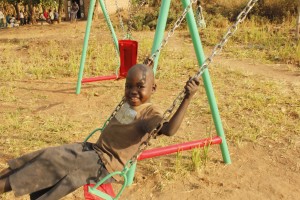
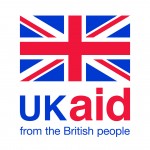
Much of a child’s early years are spent playing, exploring and testing their environment and own personal boundaries. All of this play has significant and proven benefits for a child’s early development. Research has shown that children who regularly engage in play-based learning have better cognitive flexibility, working memory and self-regulation ability.
Here at African Revival, we recognise the immense benefits of play-based learning and have incorporated it as one of the major elements of our jumpstart! nursery education programme. In our 10 jumpstart! schools, we are building playgrounds, training teachers in how to guide play-based learning and make their own play materials using natural materials, and even teaching parents how to encourage productive play at home. We know that play is incredibly important for early childhood development – but what exactly are the top benefits?
- Better behaviour
Children behave better in the classroom when they have had the chance to blow off steam and release energy on the playground during the day. Playing is a known method of stress release that can help with a child’s emotional welfare, as nursery teacher Gino, from Purongo Hill Primary School in Nwoya district says: “the playground is where the children release their stress and refresh their minds between learning”
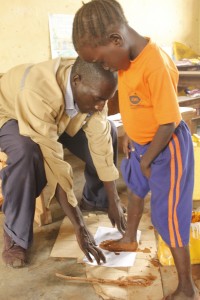
- Good social skills
Play can help young children become more aware of other people’s feelings and develop empathy. During play, whether it is inside or outside of the environment, children must interact and cooperate with each other, as well as share play equipment which requires good communication skills. Children can build relationships, learn to resolve conflicts, negotiate and regulate their emotions and behaviors. According to nursery teacher Gino, increased play-based learning at Purongo Hill has “eliminated that spirit of being selfish, and also helping the children with sharing because of that thing of collaboration”
- Improves academic performance
In 2009, research from the American Journal of School Health found that the more physical activity tests children can pass, the more likely they are to do well on academic tests. According to psychologist Kathryn Hirsch Pasek, “Children learn to count when they’re doing hopscotch […] They are telling stories on the playground, and they’re getting active.”
Furthermore, play can nurture qualities like self-discipline and attentional control, which can be just as vital for school readiness as content knowledge. Children with longer attention spans and self-control can focus more on tasks in the classroom. This is because when children engage in make-believe play that involves role playing, there are generally rules that they must follow which involves regulating their natural self and behavior. By practicing this in a safe, fun environment, their self-control is enhanced, which can then be transferred to a classroom setting.
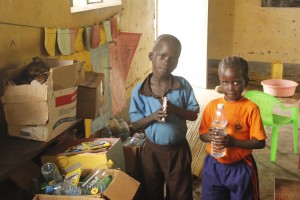
- Language development
Moreover, make-believe play that involves role playing can also help children to develop their language skills, as was shown in a British study (Lewis, 2000). Infant pupils were asked to engage in symbolic play, whereby they use objects, actions or ideas to represent other objects, actions or ideas. For example, a child may put a wooden block to her ear as a pretend mobile phone. Children who scored higher on a test of symbolic play had better language skills, both in terms of what they understood and spoke. This suggests that play helps to develop and solidify language skills.
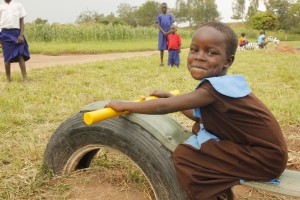
- Increases enthusiasm for learning
In northern Uganda, where drop out rates amongst primary school students are very high, play-based learning can encourage pupils to stay in school and attend more frequently. Indeed, at Purongo Hill Primary School in Nwoya district, nursery teacher Gino says that enrolment has skyrocketed since African Revival constructed a playground at the school (from 30 pupils in the nursery section to 120): “the playground has been an advantage to us because it has drawn in children, increased enrolment and reduced drop outs”.
Posted in News |
Tagged Acholi, African Revival, Development, ECD, Headteacher, inspiration, Inspiring Head Teacher, International Development, Jumpstart!, play, Teacher training, Uganda |
Leave a comment
Posted on May 5, 2016 by Sophie Hicks
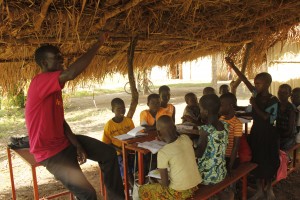 In rural Nwoya district, Northern Uganda, many children are not in school. Some have dropped out – others have never been to school at all. The reasons for dropping out are myriad. Some families do not have enough money to pay the fees for multiple children at school, as well as school uniform and scholastic materials. Other children are required to stay at home to care for sick relatives or help with household chores.
In rural Nwoya district, Northern Uganda, many children are not in school. Some have dropped out – others have never been to school at all. The reasons for dropping out are myriad. Some families do not have enough money to pay the fees for multiple children at school, as well as school uniform and scholastic materials. Other children are required to stay at home to care for sick relatives or help with household chores.
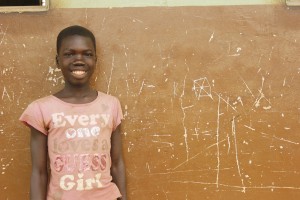 Molly (right) is one young girl who, at 13 years old, had never been to school until she enrolled in Speed School. Her uncle, who she lives with, did not allow her to go to school; instead she stayed at home to do most of the cooking and cleaning. And hers is not an isolated case. Sarah, also 13, had to drop out of school when her father spent all the money meant for school fees on the bride price for Sarah’s step mother. Paying dowry is still a tradition in northern Uganda and often impoverishes families. After the money had been used on his new bride, Sarah’s father asked her and her 4 siblings to stay at home until he found the money for their education. 3 are now enrolled in Speed School, which is a free initiative.
Molly (right) is one young girl who, at 13 years old, had never been to school until she enrolled in Speed School. Her uncle, who she lives with, did not allow her to go to school; instead she stayed at home to do most of the cooking and cleaning. And hers is not an isolated case. Sarah, also 13, had to drop out of school when her father spent all the money meant for school fees on the bride price for Sarah’s step mother. Paying dowry is still a tradition in northern Uganda and often impoverishes families. After the money had been used on his new bride, Sarah’s father asked her and her 4 siblings to stay at home until he found the money for their education. 3 are now enrolled in Speed School, which is a free initiative.
The reasons why children have dropped out of school are complex and difficult to address. But now a new initiative called Speed School, implemented by African Revival in partnership with Geneva Global, is aiming to get these drop outs back into school. The Speed School programme was previously implemented by Geneva Global in Ethiopia. The project was such a success that it was brought to Uganda and adapted to the national education system. African Revival is now managing 30 Speed School classes, each with 25 pupils. Over one year, we aim to educate and reintroduce 750 pupils into mainstream education and address the root causes of primary school drop outs and absenteeism.
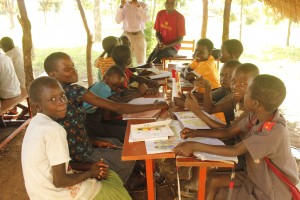 Speed School is an accelerated learning programme which will teach children the first 3 years of the primary curriculum, after which they will re-join the formal education system in Grade 4. Children are taught using effective participatory and child-centred learning methods which the Speed School teachers (called facilitators) learned during an intensive training session at the start of the project. The facilitators are also taught different ways to lesson plan, make learning aids, and encouraged to place an emphasis on critical thinking skills in class. Reduced class sizes of 25 pupils (the average teacher-pupil ratio in government schools is 1:80) also makes classes easier to manage and improves behaviour and pupil motivation. Moreover, the facilitators are from the local community, so as well as teaching the condensed curriculum, they can also monitor their pupils to ensure that they stay in Speed School and do not drop out again.
Speed School is an accelerated learning programme which will teach children the first 3 years of the primary curriculum, after which they will re-join the formal education system in Grade 4. Children are taught using effective participatory and child-centred learning methods which the Speed School teachers (called facilitators) learned during an intensive training session at the start of the project. The facilitators are also taught different ways to lesson plan, make learning aids, and encouraged to place an emphasis on critical thinking skills in class. Reduced class sizes of 25 pupils (the average teacher-pupil ratio in government schools is 1:80) also makes classes easier to manage and improves behaviour and pupil motivation. Moreover, the facilitators are from the local community, so as well as teaching the condensed curriculum, they can also monitor their pupils to ensure that they stay in Speed School and do not drop out again.
As well as Speed School classes, Geneva Global have also established self-help groups for the parents of the enrolled pupils. In these groups parents – primarily mothers – will be trained in Income Generating Activities to economically empower them so they are able to meet the financial demands of educating their children. These activities may include Village Savings and Loans Associations (VSLA), agriculture or business activities.
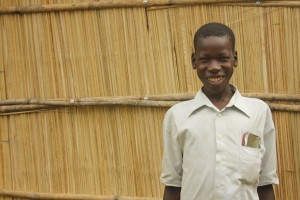 By ensuring the parents are empowered economically, the Speed School programme aims to address one of the main reasons why children dropped out of school in the first place: lack of money for school fees. Even if parents want their children to gain an education, school is not always a priority. Richard, a bright-eyed 13 year-old, dropped out of school in 2012 because both of his parents had died. He now lives with his grandmother, and has a hand-to-mouth existence: his grandmother is frail and can only generate enough money to feed Richard. No money is left for school fees. But now Speed School is helping Richard to study again and get an education, so one day he can achieve his dream of becoming a pilot: “I want to be a pilot so I can move in different places, and learning ways of living and different cultures”. Motivated and focus, we are sure Richard, along with the other children in Speed School, will excel this year in this supportive programme and go on to succeed in the future.
By ensuring the parents are empowered economically, the Speed School programme aims to address one of the main reasons why children dropped out of school in the first place: lack of money for school fees. Even if parents want their children to gain an education, school is not always a priority. Richard, a bright-eyed 13 year-old, dropped out of school in 2012 because both of his parents had died. He now lives with his grandmother, and has a hand-to-mouth existence: his grandmother is frail and can only generate enough money to feed Richard. No money is left for school fees. But now Speed School is helping Richard to study again and get an education, so one day he can achieve his dream of becoming a pilot: “I want to be a pilot so I can move in different places, and learning ways of living and different cultures”. Motivated and focus, we are sure Richard, along with the other children in Speed School, will excel this year in this supportive programme and go on to succeed in the future.
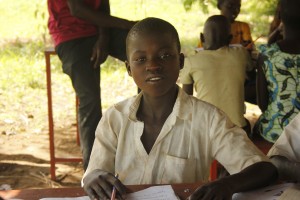
Posted in News |
Tagged Acholi, African Revival, Changemaker, Education, Gulu, Headteacher, inspiration, Inspiring Head Teacher, International Development, Lord's Resistance Army, Northern Uganda, Nursery School, School Development, Teacher training |
Leave a comment
Posted on February 23, 2016 by Sophie Hicks
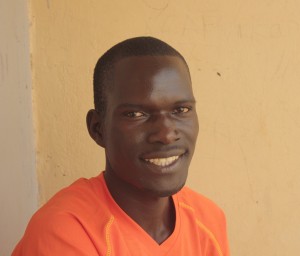

Sunday is only 22 years old, yet already he is the headteacher of Lacek Community School in Nwoya district! To hold such an important position at such a young age is testimony to both his considerable talents as a teacher and to how highly he is considered in the surrounding community. But Sunday is not just a Headteacher. He is also participating in the Teacher Changemaker network, which we coordinate in partnership with STIR Education in Northern Uganda! So far, Sunday has implemented an incredibly successful Village Savings and Loans Association in Lacek School (they have saved an impressive 3,775,400 since May) which is also helping to bring parents closer to the school to monitor their children’s education, improving student motivation and performance. Read on to discover how Sunday is changing the way the local community views education and impacting on the next generation at Lacek Community School!
My parents were escaping from the Lord’s Resistence Army, so I was born in Gulu. But our original homeland is in Kinene. We moved back to Kinene in 2006 when the war ended. I was 13 years old. I have only 3 brothers without any girls. My mother gave birth to 4 girls but they all passed away. There were only 4 boys left. I have four half brothers and sisters from my fathers second wife. We all live together in Kinene. My father had many wives, almost 11. He is 80 years old now.
Teaching became interesting to me because of a certain teacher in my primary, called Mr Laloo. That teacher really made me who I am. I struggled to learn English, so he put a lot of work into teaching me how to speak and write well. I liked the way he taught me, and I promised to myself I would become a teacher.
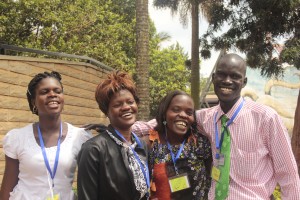 Being part of the Teacher Changemaker network made me realise that the problem in our schools is parent engagement. It touches me. There is a lack of parent engagement in these communities – parents have very negative attitudes towards education. I saw that many were not able to pay their children in school. I sat down with the School Management Committees and asked, which is the best way we can help these parents? I decided to bring the Village Savings and Loans Association (VSLA), which other localities are doing successfully. When they save money for 2 months, that money alone is able to pay the school fees for their children. So I decided to mobilize parents. Many parents joined me. Every week they come and save their money in the pool. So far they have saved 3,775,400 (since May 2015).
Being part of the Teacher Changemaker network made me realise that the problem in our schools is parent engagement. It touches me. There is a lack of parent engagement in these communities – parents have very negative attitudes towards education. I saw that many were not able to pay their children in school. I sat down with the School Management Committees and asked, which is the best way we can help these parents? I decided to bring the Village Savings and Loans Association (VSLA), which other localities are doing successfully. When they save money for 2 months, that money alone is able to pay the school fees for their children. So I decided to mobilize parents. Many parents joined me. Every week they come and save their money in the pool. So far they have saved 3,775,400 (since May 2015).
Children are getting benefits from their parents being in the VSLA. Their parents can borrow money and pay them, buy for them uniform, the scholastic materials. Also, the parents are able to monitor their children, whether they are in the class, whether they are learning. They first move around all the school compound checking what is wrong, what is good, and they feedback later.
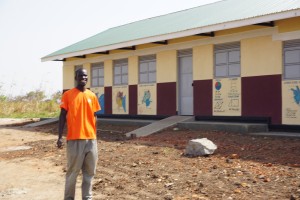 In our culture, when you are a teacher, people prefer to be like you, because teachers are able to make unknown known. So people take teachers as the most important thing for the community. The change makers. Whenever there are any problems they first consult the teacher. During village meetings, I am always the chief’s guest when they are making bylaws. I help them to decide which ways to manage the schools and build the community. And when we are making school rules, we invite the chiefs to help. So when the child is not at school, we can give a phone call to the chief to inform him about the problem within his area of service.
In our culture, when you are a teacher, people prefer to be like you, because teachers are able to make unknown known. So people take teachers as the most important thing for the community. The change makers. Whenever there are any problems they first consult the teacher. During village meetings, I am always the chief’s guest when they are making bylaws. I help them to decide which ways to manage the schools and build the community. And when we are making school rules, we invite the chiefs to help. So when the child is not at school, we can give a phone call to the chief to inform him about the problem within his area of service.
I am getting some great advice from the network, like its OK to make mistakes. For us we take mistakes as a very bad thing. When we make mistakes in the Ugandan education system, people do not like it. But when I see anyone making mistakes, I just help them, and do not tell them off. The network always tells us that through mistakes, you can learn.
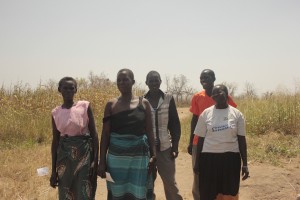 The part of the network that has motivated me a lot is friendship. Before, I didn’t know any of the other teachers in Nwoya district who are now in the network. I speak with my friend Gino (a pre-primary teacher at Purongo Hill Primary School) by phone almost daily. We just call each other and share the things from our day.
The part of the network that has motivated me a lot is friendship. Before, I didn’t know any of the other teachers in Nwoya district who are now in the network. I speak with my friend Gino (a pre-primary teacher at Purongo Hill Primary School) by phone almost daily. We just call each other and share the things from our day.
In the future, after going for my ECD diploma, I’m hoping to be a tutor and train teachers in Early Childhood Development. I can see myself so much specialised in the ECD because I understand young children’s behaviour.
My daughter, she is very stubborn! She is around 2 years old. At around 1 ½ years, she was also able to speak. She acquired language very early. I play with her everyday, even if she is not understanding everything I say. She is called Akello Charity Hope. She loves playing, she plays so much. When I reach home in the evening, we sing songs together. I will arrive and she will immediately come to me to sing songs, to speak funny things. In the future I want her to be like me – a teacher.
Posted in News |
Tagged Acholi, African Revival, Changemaker, Development, ECD, Education, endurance, Gulu, Headteacher, inspiration, International Development, Interview, Jumpstart!, Kampala, Nursery, Nursery School, Profile, Pupils, School, School Development, STIREducation, Teacher training, Uganda, World Teachers' Day |
Leave a comment
Posted on February 17, 2016 by Sophie Hicks
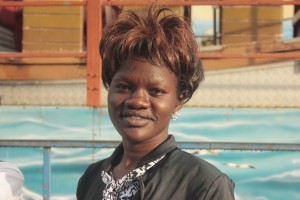

Irene started her early career as a tap dancer. Trained for a year by a man from California named Jack, she still has a real passion for the dance with ‘the glass shoes’. Now an Early Childhood Development teacher in Anaka P7 Primary School in Nwoya district, Northern Uganda, she regularly brings song and dance into her lessons as a way of energising her pupils and bringing her classroom alive. This interactive style of teaching is just one of the things she has learned from participating in Teacher Changemaker network, implemented by STIR Education and coordinated in Nwoya district by African Revival.
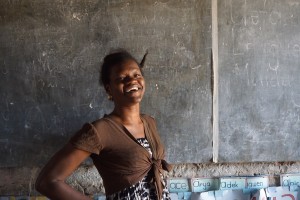 The Teacher Changemaker network encourages teachers across Uganda to introduce ‘micro innovations’, new techniques to increase the quality of education, into their lessons to respond to the challenges they face in the Ugandan education system. For Irene and her colleagues at Anaka P7, one of the main challenges is lack of parental engagement: “We decided that parental engagement is the biggest problem affecting our school. There are parents that, when you call them for a meeting, they don’t want to come. They don’t provide the scholastic materials for their children. You find a child will come to school hungry, without having eaten, and not be able to concentrate in class. Children like this end up failing.” She and her fellow teachers have introduced a procedure to counteract this challenge: “The first step is to call the parents for a meeting. The second stage is to go up to the home to see what is the problem stopping this child from performing. And the time comes when the parents start to listen, slowly, until they are now following the advice of the teacher. We have used this procedure and now there are many who come to check the progress of the children”. This micro innovation is already having positive results. This year, more children in Irene’s class passed, and she has noticed a change in the attitude of her students in class, now their parents are taking more of an interest in their education.
The Teacher Changemaker network encourages teachers across Uganda to introduce ‘micro innovations’, new techniques to increase the quality of education, into their lessons to respond to the challenges they face in the Ugandan education system. For Irene and her colleagues at Anaka P7, one of the main challenges is lack of parental engagement: “We decided that parental engagement is the biggest problem affecting our school. There are parents that, when you call them for a meeting, they don’t want to come. They don’t provide the scholastic materials for their children. You find a child will come to school hungry, without having eaten, and not be able to concentrate in class. Children like this end up failing.” She and her fellow teachers have introduced a procedure to counteract this challenge: “The first step is to call the parents for a meeting. The second stage is to go up to the home to see what is the problem stopping this child from performing. And the time comes when the parents start to listen, slowly, until they are now following the advice of the teacher. We have used this procedure and now there are many who come to check the progress of the children”. This micro innovation is already having positive results. This year, more children in Irene’s class passed, and she has noticed a change in the attitude of her students in class, now their parents are taking more of an interest in their education.
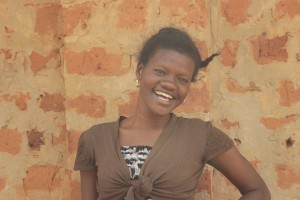 Irene is confident that the innovations and increased focus on critical analysis and problem solving that the Changemaker network has facilitated will continue to have a positive impact on her primary school: “as long as we keep innovations coming to Anaka p7, there will be a great many positive changes. Though we have some parents who don’t listen to the school, in time there will be a lot of improvements because us teachers have learned ways of solving the problems we face”
Irene is confident that the innovations and increased focus on critical analysis and problem solving that the Changemaker network has facilitated will continue to have a positive impact on her primary school: “as long as we keep innovations coming to Anaka p7, there will be a great many positive changes. Though we have some parents who don’t listen to the school, in time there will be a lot of improvements because us teachers have learned ways of solving the problems we face”
The network is also having a positive impact on Irene’s confidence and motivation as a teacher: “The network taught me that, if you are a teacher, you should have confidence in everything you do, you should be exemplary, you should have knowledge, you should be someone who searches for things that will make a change. Someone creative in the mind who will search for ways to make the children learn well and pass”.
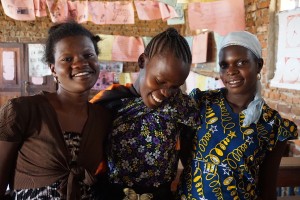 She also enjoys the unity and collaboration with the other Teacher Changemakers, which is a real advantage for all participants. Teaching in any part of the world can be a difficult job, and in Uganda the lack of good infrastructure, teaching materials and training exacerbates the already considerable challenges. By encouraging teachers to share and support each other, the Teacher Changemaker network is looking to alleviate these challenges through an informal support system that allows participants to vocalise their problems and search for solutions together. This style of network also means that innovations produced by the teachers are tailored to the specific localised environments across Uganda, rather than ready-made solutions designed out of context. This contributes to the success of the network and its popularity amongst its Changemakers, especially Irene, who advised teachers to try out the new Changemaker innovations for themselves: “My advice for other teachers is this: go and put the micro innovations into use, because they will help a lot. And help you learn how to communicate with others, discuss, be social and cooperative and many others. When you go back to school tell others to do the same!”
She also enjoys the unity and collaboration with the other Teacher Changemakers, which is a real advantage for all participants. Teaching in any part of the world can be a difficult job, and in Uganda the lack of good infrastructure, teaching materials and training exacerbates the already considerable challenges. By encouraging teachers to share and support each other, the Teacher Changemaker network is looking to alleviate these challenges through an informal support system that allows participants to vocalise their problems and search for solutions together. This style of network also means that innovations produced by the teachers are tailored to the specific localised environments across Uganda, rather than ready-made solutions designed out of context. This contributes to the success of the network and its popularity amongst its Changemakers, especially Irene, who advised teachers to try out the new Changemaker innovations for themselves: “My advice for other teachers is this: go and put the micro innovations into use, because they will help a lot. And help you learn how to communicate with others, discuss, be social and cooperative and many others. When you go back to school tell others to do the same!”
Posted in News |
Tagged Acholi, African Revival, Changemaker, Development, ECD, Education, inspiration, International Development, Jumpstart!, Kampala, Kilimanjaro, Nursery, Nursery School, Profile, Pupils, School, School Development, STIREducation, Teacher, Teacher training, Uganda |
Leave a comment
Posted on November 12, 2015 by Sophie Hicks
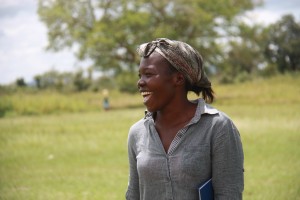 Babra Akello, aged 27, Is African Revival’s Agricultural Project Officer. Originally from Lira, she moved to Gulu together with her husband, with whom she has four year-old twins Jemimmah and Jesse. Babra completed a Certificate in General Agriculture at Busitema University in Soroti district, and is now studying part time for her degree in Agriculture at Uganda Martys University. After roles with the International Institute of Rural Reconstruction and Action Against Hunger, she joined African Revival in January 2012 as an Agricultural Extension Worker, before being promoted to Agricultural Project Officer. Here, Babra tells us more about her role with AR and her long-standing passion for farming.
Babra Akello, aged 27, Is African Revival’s Agricultural Project Officer. Originally from Lira, she moved to Gulu together with her husband, with whom she has four year-old twins Jemimmah and Jesse. Babra completed a Certificate in General Agriculture at Busitema University in Soroti district, and is now studying part time for her degree in Agriculture at Uganda Martys University. After roles with the International Institute of Rural Reconstruction and Action Against Hunger, she joined African Revival in January 2012 as an Agricultural Extension Worker, before being promoted to Agricultural Project Officer. Here, Babra tells us more about her role with AR and her long-standing passion for farming.
In my degree in agriculture I’m learning a lot. For example, the aspects of agricultural development, sustainable management of resources and different techniques of growing crops and handling animals. It’s a broad course.
My responsibilities as Agricultural Project Officer are to ensure that I directly implement African Revival’s project with the beneficiaries in the schools that we work with and to offer trainings in agricultural practices, VSLA and business skills. And also I do represent AR at a parish level, district level and country level. Now, I am implementing the school demonstration garden in 8 schools in Amuru district, so ensuring that all the good agricultural practices are taught and ensuring that what I am training the beneficiaries, they are also learning and replicating at the household level. And with the pupil’s clubs, ensuring that they are taught business models so that they can be well acquainted with the life after school, so that in case they don’t continue with their studies they can be self-reliant and not dependent on their parents.
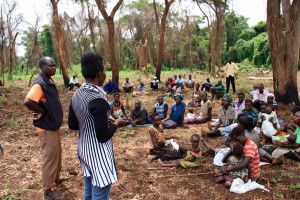 I have done many vocational trainings while working for African Revival and other organisations. I underwent defensive motorbike training. This is more of a safety thing, when you are riding, what you should observe, and actually how to overcome some of the faults or breakdowns in the motorcycle, so you can fix them without taking them to the mechanics. Just to keep you safe when you are driving.
I have done many vocational trainings while working for African Revival and other organisations. I underwent defensive motorbike training. This is more of a safety thing, when you are riding, what you should observe, and actually how to overcome some of the faults or breakdowns in the motorcycle, so you can fix them without taking them to the mechanics. Just to keep you safe when you are driving.
During my free time I like interacting with the children. With my own, but even with other children. The children like me even if I reach home you may not even understand who is my child or who is not my child because every time I am surrounded by children so I just enjoy interacting with them in my free time. The children collect their homework and I actually help them because as a parent, you should guide them. Where we live, there are many children and they are going in the same school, and they converge together and we do it together.
Being a child-centred person, I so much enjoy working with the children involved in the SDG Pupil’s Entrepreneurship Club. I just enjoy focusing on the future of the children. And the other thing I enjoy most is also working with the community that African Revival works with. It is not easy in the north to find parents in the school, but what I like most about our project is that it brings the parents closer to the school, and makes them know the benefit of education. Children can’t move forward without the support of their parents, so therefore African Revival having their projects bring parents closer to the school makes me more interested, and I enjoy it.
When I was younger, I wanted to be a veterinary doctor. In my village, we had only one veterinary doctor, and my father used to have animals, chickens, goats, cows, and each time this vet comes, he would treat the animals and he would be given a big sum of money. And I put into my mind that I must study and become a vet doctor so that I can treat these animals of ours on my own! And I wanted to actually out-compete him in the village so that I could also be the one getting such money from the communities around us. I would not say my dream changed, because I went for a certificate in general agriculture, whereby I also studied animals and crops at the same time, so I can even treat the animals.
I started farming when I was six years old. I planted maize in that first year and I got 13,000 shillings. And I remember my mother brought a chicken with that money, and the chicken multiplied so so much, and it helped me. And then when I was ten, I planted cassava, and it so happened that that year, there was too much hunger by the time my cassava was getting ready, and it helped in sustaining our family – some was sold and some was consumed.
I secured some land in Nwoya, so now I am doing my farming in Nwoya. At first I brought 6 achres, now I’ve added 4, so I own 10 acres with my husband as a family. I have a casual worker, so I am renting for the casual worker, but I plan this December to put up some small house there, so the worker can stay there. I very much want to expand, because with time I want to get back to farming. That’s the plan I have.
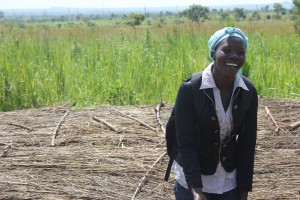 In the future, I want to farm commercially. I want to have a diversity of enterprises. Right now I have some perennials, I have some fruit trees, I have field crops, and I plan to integrate vegetables, so I want to have actually a diversity of enterprises. And soon I want to buy some animals. At the moment I am still using people’s labour in terms of hiring tractors and ox-ploughs. But already I have brought my own plough. So this December I am planning to buy the ox animals so that I do not have to continue hiring and keep more of the profits.
In the future, I want to farm commercially. I want to have a diversity of enterprises. Right now I have some perennials, I have some fruit trees, I have field crops, and I plan to integrate vegetables, so I want to have actually a diversity of enterprises. And soon I want to buy some animals. At the moment I am still using people’s labour in terms of hiring tractors and ox-ploughs. But already I have brought my own plough. So this December I am planning to buy the ox animals so that I do not have to continue hiring and keep more of the profits.
I am very much happy with the role that agriculture plays in my life. Agriculture provides a source of food for myself, my home and income generation. In Uganda, as a whole, agriculture plays a vital role and is the backbone of the country.
Posted in News |
Tagged Acholi, African Revival, Gulu, School Development, School garden, Uganda |
Leave a comment





















